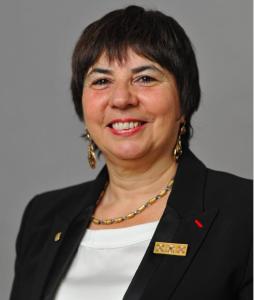Lidia Vallarino Memorial Lecture
March 2, 2017

Hybrid Inorganic Materials. From Fundamentals to Applications
April 7th, 2017, 4-5:30 pm, MCAL 2100
Luisa De Cola
University of Strasbourg, France
Dedicated to the memory of Prof. Lidia Vallarino (Dr. V)
My passion for luminescent molecules has started during my post-doc, in Dr. V.‘s lab.
Such an interest continued during my entire career and in this talk I wish to present some of the most recent results on luminescent platinum complexes that can undergo self-assembly leading to new materials such as sensors, biolabels…. [1].
The monitoring of the different emission properties, used as fingerprint for each of the assembled species, allowed an unprecedented real-time visualization of the evolving self-assemblies [2]. We have been able to control the assemblies and obtain uniform size of the aggregates. Such finding can form the basis for the understanding of more complex and relevant aggregates such as amyloid fibers responsible to dramatic diseases such as Alzheimer and Parkinson.
The cure of diseases is also related to an efficient deliver of drugs and/or biomolecules to the desired organs. In the last part of the talk I will illustrate how special nanocontainers, able to break upon an external stimulus, can be realized and applied in vivo. In particular I will discuss the creation of porous materials or capsules, [3] able to entrap and release large macromolecules such as proteins, that can be destroyed with a redox reactions, [4] enzymatic degradation, [5] and pH.
References
[1] C. A. Strassert, L. De Cola et al. Angew. Chem. Int. Ed., 2011, 50, 946; M. Mauro, L. De Cola et al. Chem. Commun. 2014, 50, 7269; D. Genovese, L. De Cola et al. Adv. Funct. Mater. 2016, 26, 5271–5278.
[2] A. Aliprandi, M. Mauro, L. De Cola Nature Chemistry , 2016, 8, 10.
[3] E.A. Prasetyanto, A. Bertucci, D. Septiadi, R. Corradini, P. Castro-Hartmann, L. De Cola Angew. Chem. Int. Ed. 2016, 55, 3323.
[4] L. Maggini, I. Cabrera, A. Ruiz-Carretero, E. A. Prasetyanto, E. Robinet, L. De Cola Nanoscale, 2016, 8, 7240
[5] L. Maggini, L. Travaglini, I. Cabrera, P. Castro-Hartmann, L. De Cola Chem. Eu. J., 2016, 22, 3697
Luisa De Cola has been Professor Exceptionnelle at the University of Strasbourg (ISIS) as chair of Supramolecular and Bio-Material Chemistry since September 2013, and part time scientist at the INT-KIT, Karlsruhe, Germany. She has also been Professor at the Institut Universitaire de France (IUF) since 2016.
She was born in Messina, Italy, where she studied chemistry. After a post-doc at the Virginia Commonwealth University, USA, she was appointed Assistant Professor at the University of Bologna (1990). In 1998 she was appointed Full Professor at the University of Amsterdam, The Netherlands. In 2004 she moved to the University of Muenster, Germany.
She is recipient of several awards, the most recent being the IUPAC award as one of the Distinguished Women in Chemistry and Chemical Engineering (2011), the International Prize for Chemistry “L. Tartufari” from Accademia dei Lincei (2015) and the Catalan -Sabatier prize from the Spanish Royal Academy of Science (2015). She was elected in 2014 as a member of the German National Academy of Sciences Leopoldina and in the same year was nominated “Chevalier de la Légion d' Honneur” by the President of the French Republic, François Hollande. In 2016 she was elected member of the Akademie der Wissenschaften un der Literatur of Mainz.
Her main interests are luminescent and electroluminescent complexes and their assemblies and nano-, porous and degradable structures for bio-applications. She has published 330 articles in international peer reviewed journals and filed 36 patents (H index = 62).